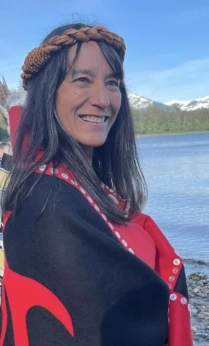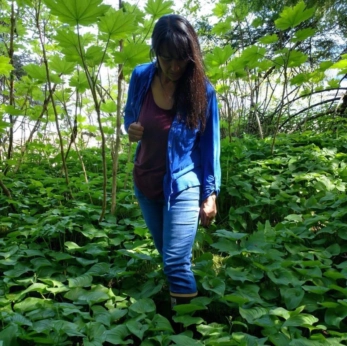Meet the Modern Farming Consultant Sharing Ancient Culture and Traditions in Alaska
A member of the Tlingit tribe, Naomi Michalsen is working to share Indigenous food systems with others to ensure those traditions don’t get lost.
Meet the Modern Farming Consultant Sharing Ancient Culture and Traditions in Alaska
A member of the Tlingit tribe, Naomi Michalsen is working to share Indigenous food systems with others to ensure those traditions don’t get lost.

courtesy of Michalsen
Gifting your first catch, whether a moose, a deer or berries, is a Tlingit tradition.
“As a child, you learn that giving away the first catch is part of the respect for the animal, culture, and people, so I had my grandson go with me to pick berries,” says Naomi Michalsen.
“When you pick little lingonberries, it’s like picking up marbles off the ground—it’s a lot of work. He picked up the small berries, and when we were done, I told him we were going to give them away to an elder. At first, he was confused and unsure; he felt like it was so much work he should get to keep the berries. When I explained the reasoning to him, he was happy with that.
“We took them to the elder’s house and placed them on the doorknob in a bag and walked away. It was a powerful lesson for my grandson.”

Michalsen, whose Tlingit name is Kaasei, lives in Ketchikan, AK, the traditional home of the Tlingit people. Food has always been an important part of Michalsen’s life, both personally and within her community. Within the Tlingit culture, the connection to food was once seen as subsistence farming and foraging. But tribe elders didn’t like the connotations of the term subsistence, feeling that it meant “less than.”
“They felt our food was so abundant, and we had so much bounty, and it was so integral to our survival, they renamed the term ‘subsistence’ to a translated version meaning ‘Tlingit food is a way of life,’” says Michalsen.
The Tlingit hunter/gatherers have inhabited the Alaska territory for thousands of years. They relied on available resources such as seafood, plants and berries for survival, nurturing and harvesting what was indigenous to the area.
Still, many Tlingit members were disconnected from the land because of physical removal from it.
“We were physically removed from the land—and because of colonization, boarding schools and separation—so much loss. The languages and our way of life were totally disrupted. As a result, many of us are trying to reconnect to that,” says Michalsen. That attempt to reconnect to a shared heritage is part of what led her to create Kaasei Training & Consulting, where she teaches about the power of Indigenous plants and foods to “honor the past, create community and change the future.”
In her educational courses, Michalsen explores the hundreds of plants that are abundant in Alaska. There’s the red and yellow cedar, used for medicinal teas as well as ceremonial fires. She looks at sustainable and respectful harvesting practices of salmon and other fish, fireweed, Labrador tea, stinging nettle, goose tongue, skunk cabbage, wild rose, numerous varieties of berries including salmon berries and red elderberry, plus hundreds of edible seaweed and kelp varieties.
“The plants are abundant,” says Michalsen. “Unfortunately, a lot of these plants are over-harvested, so it’s important to teach respectful harvesting practices. We look at these plants as sacred.”
Since the Tlingit people were separated from their culture and traditions, and their culture and history weren’t taught in schools, Michalsen says it wasn’t until she was an adult that she began to reconnect and learn the ways of her people.
Her education began with elders asking her to harvest certain plants for them. She learned each plant’s growing methods, when they were ripe and how to respectfully harvest, leaving enough for the plant to continue growth for future harvests. Then, in the early 90s, she attended a spiritual gathering of the tribes in Siberia. It was a transformational experience, says Michalsen, where she was asked by a group of women to help harvest some medicinal plants. She says the opportunity to meet others who live “close to the land and practice their ways” led to her inspiration to share this knowledge with others. She started by working for the local tribe, and also as the director at a domestic violence shelter. In traveling around the state and training others, she realized her purpose was that of prevention, intervention and healing.
“That’s what I’ll hopefully do for the rest of my life as it’s the best way I can be of service to my community.”

Whether it’s getting outside on a trail or at low tide, harvesting and experiencing all the senses in the outdoors, or it’s a classroom situation where Michalsen brings the plants to people for educational purposes, she helps tribal members remember where they came from and what is available just outside their doorsteps.
In hands-on classes, she might teach methods for harvesting and making medicines, creating first aid kits with insect repellant, salves and herbal teas, or cooking something together to remember ancient practices.
Her classes run the gamut from four-day training or cultural workshops to hour-long presentations or an online plant symposium. She says there’s always more connection to the concepts of sustainable foraging and traditional meals when folks have a chance to experience the foods themselves.
”Many of us, we … didn’t grow up with these kinds of foods and tastes, and so when we try these things, and we realize how good they are for us and how delicious they taste, we’re more likely to want to protect those traditions. But, unfortunately, if we’re not connected to the land and to the foods, we’re not likely to care about these things.”
Sharing these practices is crucial, because, she says, “If we don’t share with anyone, then it’s not going to get passed down. And that’s what happened to our parents and grandparents when they were forced to relocate or forced into boarding schools. They were beaten for talking their language or eating their foods. So, in this way, by educating and sharing our culture and traditions, we’re reclaiming our history and who we are.”
Follow us
This work is licensed under a Creative Commons Attribution-NoDerivatives 4.0 International License.
Want to republish a Modern Farmer story?
We are happy for Modern Farmer stories to be shared, and encourage you to republish our articles for your audience. When doing so, we ask that you follow these guidelines:
Please credit us and our writers
For the author byline, please use “Author Name, Modern Farmer.” At the top of our stories, if on the web, please include this text and link: “This story was originally published by Modern Farmer.”
Please make sure to include a link back to either our home page or the article URL.
At the bottom of the story, please include the following text:
“Modern Farmer is a nonprofit initiative dedicated to raising awareness and catalyzing action at the intersection of food, agriculture, and society. Read more at <link>Modern Farmer</link>.”
Use our widget
We’d like to be able to track our stories, so we ask that if you republish our content, you do so using our widget (located on the left hand side of the article). The HTML code has a built-in tracker that tells us the data and domain where the story was published, as well as view counts.
Check the image requirements
It’s your responsibility to confirm you're licensed to republish images in our articles. Some images, such as those from commercial providers, don't allow their images to be republished without permission or payment. Copyright terms are generally listed in the image caption and attribution. You are welcome to omit our images or substitute with your own. Charts and interactive graphics follow the same rules.
Don’t change too much. Or, ask us first.
Articles must be republished in their entirety. It’s okay to change references to time (“today” to “yesterday”) or location (“Iowa City, IA” to “here”). But please keep everything else the same.
If you feel strongly that a more material edit needs to be made, get in touch with us at [email protected]. We’re happy to discuss it with the original author, but we must have prior approval for changes before publication.
Special cases
Extracts. You may run the first few lines or paragraphs of the article and then say: “Read the full article at Modern Farmer” with a link back to the original article.
Quotes. You may quote authors provided you include a link back to the article URL.
Translations. These require writer approval. To inquire about translation of a Modern Farmer article, contact us at [email protected]
Signed consent / copyright release forms. These are not required, provided you are following these guidelines.
Print. Articles can be republished in print under these same rules, with the exception that you do not need to include the links.
Tag us
When sharing the story on social media, please tag us using the following: - Twitter (@ModFarm) - Facebook (@ModernFarmerMedia) - Instagram (@modfarm)
Use our content respectfully
Modern Farmer is a nonprofit and as such we share our content for free and in good faith in order to reach new audiences. Respectfully,
No selling ads against our stories. It’s okay to put our stories on pages with ads.
Don’t republish our material wholesale, or automatically; you need to select stories to be republished individually.
You have no rights to sell, license, syndicate, or otherwise represent yourself as the authorized owner of our material to any third parties. This means that you cannot actively publish or submit our work for syndication to third party platforms or apps like Apple News or Google News. We understand that publishers cannot fully control when certain third parties automatically summarize or crawl content from publishers’ own sites.
Keep in touch
We want to hear from you if you love Modern Farmer content, have a collaboration idea, or anything else to share. As a nonprofit outlet, we work in service of our community and are always open to comments, feedback, and ideas. Contact us at [email protected].by Jill Dutton, Modern Farmer
October 27, 2023
Modern Farmer Weekly
Solutions Hub
Innovations, ideas and inspiration. Actionable solutions for a resilient food system.
ExploreExplore other topics
Share With Us
We want to hear from Modern Farmer readers who have thoughtful commentary, actionable solutions, or helpful ideas to share.
SubmitNecessary cookies are absolutely essential for the website to function properly. This category only includes cookies that ensures basic functionalities and security features of the website. These cookies do not store any personal information.
Any cookies that may not be particularly necessary for the website to function and are used specifically to collect user personal data via analytics, ads, other embedded contents are termed as non-necessary cookies.
It’s fascinating to meet a modern farming consultant who is dedicated to preserving and sharing ancient culture and traditions in Alaska. Her work embodies the commitment to preserving cultural heritage and sustainable practices.
I love giving away the first catch! Like tithing a rewarding habit allowing us to be aware of others and environment. Fascinating.